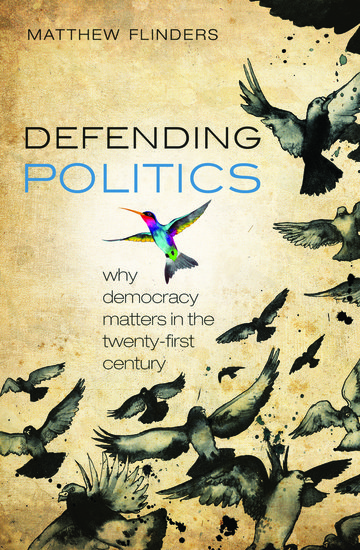By Matthew Flinders
Do we have a constitution? What is the British constitution? Does anyone actually care? At one level the answers to these questions are relatively simple and straightforward. ‘Yes’ — we do have a constitution but its constituent elements are scattered amongst a range of documents and within the tacit understandings of a number of parliamentary conventions; the British constitution is — through accident and design — a mess that has evolved in a muddled manner, betraying the existence of a latent form of ‘club government’; ‘No’, nobody cares because this is how it has always been and we don’t trust politicians and they’re all the same.
The problem with these answers is that although they may have shaped the dominant view of the British constitution in the twentieth century they appear unable to capture and reflect the changing social and political situation in the twenty-first century. When they are reframed as being concerned with the future governance of the United Kingdom then people clearly do care about the constitution. More specifically they care when theoretical debates and questions suddenly become elements of hard, day-to-day reality. For example, setting the date for a referendum on Scottish independence suddenly raises questions about the future of the United Kingdom, and the Court of Appeal’s decision to prevent the deportation of Abu Qatada confuses the public about the balance of power between the executive and judiciary. My sense from talking and (more importantly) listening to people as I travel around the UK is not that they don’t care about British politics and its constitutional arrangements but that they simply don’t understand where power lies or why.

This takes us back to the second question and the evolution of the British constitution. David Marquand once characterized New Labour’s approach to constitutional reform as being: “a revolution of sleepwalkers who don’t quite know where they are going or why.” The introduction of a great raft of constitutional measures without any clear statement of what (in the long run) the government was seeking to achieve, any idea of how reform in one sphere of the constitution would have obvious and far-reaching consequences for other elements of the constitutional equilibrium, or any detailed analysis of the nature or model of democracy that existed towards the end of the twentieth century, therefore formed central components of the ‘Blair paradox’. As such, the public’s confusion about the distribution of powers — not to mention the existence of complex blame games and credit claims — reflects a deeper situation of democratic drift. Jack Straw may have argued with me publicly that my diagnosis is wrong and that New Labour’s reforms were underpinned by a set of underlying principles, but such theoretical back-filling remains unconvincing. The UK is suffering from constitutional anomie in the sense that reforms have been implemented — before and after New Labour — in a manner that is bereft of any underlying logic. Constitutional anomie is therefore an ailment of both mental and physical health vis-à-vis the body politic. Social and political anxiety, confusion, and frustration emerge with the result that reforms that were designed to enhance levels of public trust and confidence in politics, politicians, and political institutions can actually have the opposite effect.
If the phrase ‘constitutional anomie’ risks over-complicating what is in reality a simple issue then let us call it what it is: a constitutional mess.
It is in exactly this context that today’s report Do we need a constitutional convention for the UK? by the House of Commons’ Political and Constitutional Reform Committee makes the case for a more thorough and explicit review of our constitutional framework. Although questions may revolve around the specific structure or nature of this review, what cannot be questioned is the urgent need to look across the constitutional landscape in order to assess what exists and why, and to look to the future in terms of what we want the UK to look like in 10 or 20 years time. The impending 2014 referendum on independence for Scotland makes a thorough consideration of the future of the United Kingdom and all its component nations all the more pressing. I am well aware that in supporting the need for a review, commission, or convention of some kind to take stock of the past, present, and future of our constitutional framework I am being terribly un-British in approach — for many the thought of adopting a set of explicit constitutional principles is almost heretical — but the malleability of the British constitution has arguably been exhausted, the relationship between its constituent parts confused, and the mess that now undoubtedly exists demands urgent review and reform.
Matthew Flinders is Professor of Parliamentary Government & Governance
at the University of Sheffield. He was awarded the Political Communicator of the Year Award in 2012 and is a member of the Advisory Board for the Economic and Social Research Council’s ‘The Future of the United Kingdom and Scotland’ Programme. Jack Straw’s response to his criticisms can be found in the journal Parliamentary Affairs (Vol.63, 2010). Author of Defending Politics (2012), you can find Matthew Flinders on Twitter @PoliticalSpike and read more of Matthew Flinders’s blog posts here.
Subscribe to the OUPblog via email or RSS.
Subscribe to only politics and law articles on the OUPblog via email or RSS.
Image credit: The Houses of Parliament. Photo by Adrian Pingstone. Creative Commons License via WikiWitch on Wikimedia Commons


[…] This article was originally published on the Oxford University Press’ blog. […]
[…] This piece was originally published on the OUP Blog and is available here. […]
[…] This article was originally published on the Oxford University Press’ blog. […]